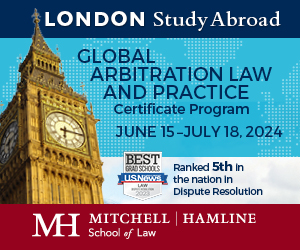So you want a job in international law?
You’re not alone. It’s one of the most popular practice areas out there. But with competition so high, jobs in this area are hard to find.
“You just gotta dig,” said Taylor Kilpatrick, senior programs manager for the American Society of International Law. “There’s no singular database to find all the open jobs.”
Kilpatrick, a graduate of The George Washington University Law School, said students must do extensive research and be consistent about searching for job openings.
The well-known places, such as the United Nations and the State Department, are extremely competitive, and most job seekers are at the mercy of local employment listings.
International law intersects with numerous specialties, including environmental, health, technology, human rights, business, government, litigation, arbitration and dispute resolution law.
It’s essential to “not only see what open jobs are out there but also see who the players are in the field that you’re interested in,” Kilpatrick said. “I can promise that it’s so much more robust than people realize.”
The challenges involved with finding a job after graduation are also significant for foreign attorneys who are studying for their LL.M.s in the United States.
“My advice for other international students would be to be prepared long in advance of graduating,” said Hanna Ahmad, who received her law degree from University of Tubingen in Germany and her LL.M. from University of San Diego School of Law in 2022.
Kilpatrick said one good source is the International Legal Jobs Twitter/X account (@IntlLegalJobs). Posts are added frequently and provide links to legal jobs around the world. The bio for the account reads, “Because international legal practice should be accessible and diverse.”

Network like crazy
Postings for international jobs tend to be few and far between, so networking is important.
It paid off for Ahmad, who landed a three-year internship with Daimler, a court internship and an internship with Baker & McKenzie in Hong Kong.
She noted, however, that a competitive advantage you might have achieved through hard work in your home country might not be worth much to employers in the U.S., “especially considering you’re an international student and competing with J.D.s from the U.S. and Canada.”
She advises doing extensive research and to“network, network, network from day one.”
“Those contacts are the keys to professional career paths that would otherwise potentially be gate-kept from you,” she said.
Paula Marques Merlin is a 2021 LL.M. graduate from Indiana University Robert H. McKinney School of Law. She credits LinkedIn and her own networking connections with finding job opportunities.
“Maintain your LinkedIn profile, updated with the work experiences from your home country, and show how those skills can be transferred to the target job in the United States,” she said. “An update on LinkedIn makes all the difference. That is how my current employer found me.”
Marques Merlin recommends listing all experiences obtained during law school, including internships and volunteer positions. And she urges students to register for every event promoted by their law schools to develop relationships with potential employers and colleagues who can be instrumental in the job search.
“Apply for as many internships as possible during law school to develop your abilities and network,” she said. “Connect with professors and staff, and ask questions about the job market, recommendations, etc.”
Marques Merlin is a lawyer from Brazil with more than 10 years of experience in corporate and commercial law. She founded her law firm in 2011, then moved with her family to the United States in 2016.
“The IU McKinney staff connected me with current and former students, opening the door to other opportunities and internships,” she said. “The school sponsored several networking events, but I also took the initiative and reached out to people who could provide more information regarding job marketing.”
Kilpatrick recommends joining professional associations. She said the ABA International Law Section and the Washington Foreign Law Society are perfect places to connect with people in the know.
“I always encourage students to be really involved in these organizations as a way to meet people who are more senior in the field and see what the different fields of interest are and where the trends are going in terms of issues of the day,” she said. “That’s where you can really find the pulse of what’s going on, especially in the academic space, but really across the board.”
In addition, her own organization, the American Society of International Law, hosts events designed to help students interested in international law. Its annual roundtable features speakers from various paths of U.S. government who share their experiences through panel discussions and networking receptions. Kilpatrick said it helps students make important connections and learn about potential jobs that fit with what they want to do.
The society also partners with international law schools, including schools in Canada, Switzerland, Germany, Israel and Ukraine. Ever since video calls became de rigueur thanks to the pandemic, the potential to connect across borders has exploded. More than a third of the society’s members are international LL.M. graduates working around the world.
Look for the obscure
After law school, Kilpatrick landed an international job: a judicial clerkship in the Supreme Court of Palau, a small island country in the western Pacific. She knew about Palau because of a case study she had done during law school, and she just happened to see an advertisement on her school’s job board.
During her time in Palau, she met court clerks who worked in such varied places as Guam and Saipan, and she had a realization.
“There’s actually a relatively strong but little-known network of international judicial law clerks,” Kilpatrick said. “There are a number of really small countries that based their legal system off of the U.S. and don’t have the size to have their own law school in their country, so they need to import lawyers to staff their courts or staff their government. There actually are a decent number of opportunities to go abroad for those types of jobs.”
Kilpatrick said graduates of U.S. programs can have good luck obtaining such jobs, but many small countries don’t advertise in the same way that larger international organizations and big law firms do.
“If you look for them, it can be a really unique experience and one where you really are seeing the genuine impact that you’re having,” she said. “You’re not just a cog in the machine; you’re really part of a team.”

